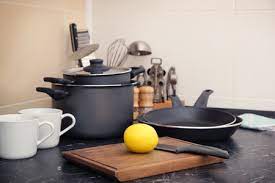- Empty cart.
- Continue Shopping
How to Choose Healthy Cooking Utensils

The importance of healthy eating is well-known, but it’s equally vital to consider the cookware and utensils you use in the kitchen. Certain materials can release harmful substances into your food, potentially affecting your health. To promote healthy cooking, it’s essential to choose the right cooking utensils.
1. Avoid Non-Stick Cookware with Harmful Coatings:
Non-stick cookware is convenient for cooking, but many traditional non-stick coatings contain perfluorinated compounds (PFCs) like Teflon, which can release toxic fumes when overheated. Consider alternatives like ceramic-coated or cast-iron cookware, which are safe and naturally non-stick.
2. Choose Stainless Steel:
Stainless steel is a popular choice for cookware and utensils due to its durability and resistance to corrosion. It doesn’t react with acidic or alkaline foods, making it a safe and versatile option.
3. Opt for Cast Iron:
Cast iron cookware, such as skillets and Dutch ovens, is renowned for its even heat distribution and excellent heat retention. It adds a small amount of iron to your food, which can be beneficial for those with iron deficiencies. Cast iron is also naturally non-stick when properly seasoned.
4. Consider Ceramic and Glass:
Ceramic and glass utensils are non-reactive and free from harmful chemicals. They are excellent choices for bakeware, mixing bowls, and serving dishes. However, handle them with care, as they can break more easily than metal or plastic.
5. Bamboo and Wood for Utensils:
Bamboo and wooden utensils are an eco-friendly and non-reactive option for stirring, flipping, and serving. They won’t scratch your cookware and are gentle on non-stick surfaces.
6. Silicone for High Heat:
Silicone utensils are heat-resistant and flexible, making them suitable for high-temperature cooking. They won’t melt or warp like some plastic utensils, and they are generally non-reactive with food.
7. Avoid Aluminum for Acidic Foods:
While aluminum cookware is affordable and conducts heat well, it can react with acidic foods, potentially altering the taste of your dishes. If you use aluminum, choose anodized aluminum, which is less reactive.
8. Stay Informed About Copper and Brass:
Copper and brass cookware are excellent conductors of heat but can react with acidic foods. If you opt for these materials, ensure they have a non-reactive lining, such as stainless steel.
9. Check for Food-Grade Certification:
When purchasing any utensils or cookware, look for food-grade certification or labels indicating they are free from harmful substances like lead, cadmium, or phthalates.
10. Consider Longevity and Durability:
Invest in quality utensils and cookware that are built to last. While they may be more expensive upfront, they will save you money in the long run and reduce waste from disposable or short-lived items.
11. Eco-Friendly Options:
If sustainability is a priority, explore eco-friendly utensils and cookware made from materials like recycled stainless steel or sustainably sourced wood.
12. Easy to Clean:
Choose utensils and cookware that are easy to clean and maintain. Non-stick surfaces are often preferred for this reason, but ensure they are free from harmful coatings.
13. Multi-Functional Tools:
Consider multi-functional utensils that can serve multiple purposes in the kitchen, reducing clutter and the need for many different tools.
14. Read Reviews and Seek Recommendations:
Before purchasing, read reviews, seek recommendations from friends or family, and research brands known for producing high-quality, safe cookware and utensils.
15. Proper Care and Maintenance:
Regardless of the material you choose, proper care and maintenance are essential to ensure the longevity of your utensils and cookware. Follow manufacturer instructions for cleaning and seasoning when necessary.
In conclusion, choosing healthy cooking utensils and cookware is an important aspect of maintaining a safe and wholesome kitchen environment. Prioritizing materials that are non-reactive, durable, and free from harmful chemicals can contribute to the overall healthiness of your meals. Additionally, by investing in quality, long-lasting kitchen tools, you can reduce waste and make eco-conscious choices for a greener kitchen.








